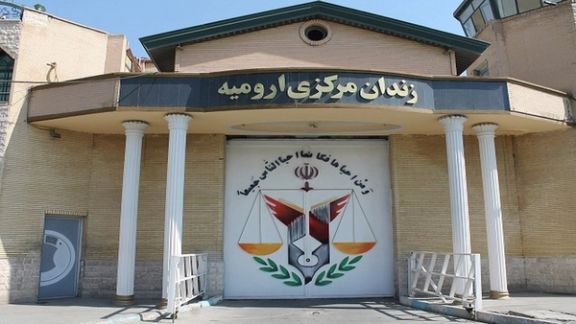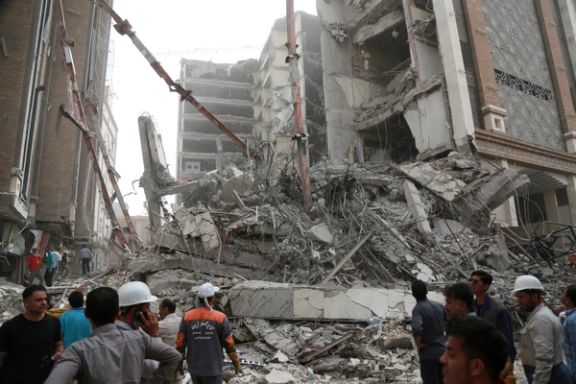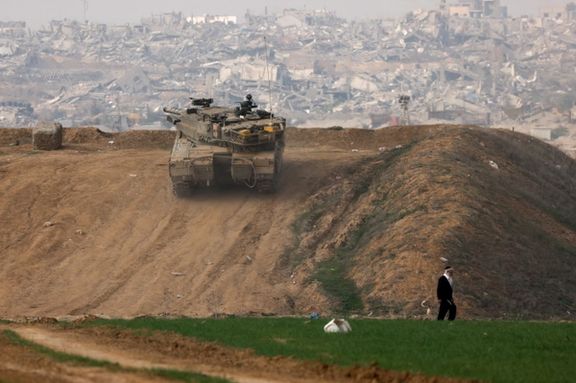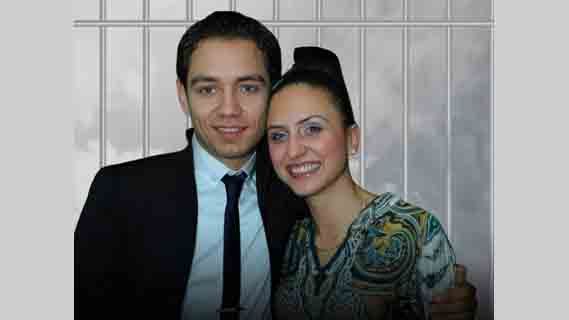Iran Hangs Four Prisoners For 'Collaborating With Israel'

Iran executed four individuals arrested last year for “collaborating with Israel” and allegedly involved in acts of sabotage, the Judiciary announced on Friday.

Iran executed four individuals arrested last year for “collaborating with Israel” and allegedly involved in acts of sabotage, the Judiciary announced on Friday.
Iran International reported on Thursday that these prisoners had been moved to solitary confinement, which usually signals impending execution for those on death row.
The Judiciary said Aran Omri, Rahman Parhazou, Vafa Hanareh, and Nasim Namazi were executed, while a fifth death row prisoner, Mansour Rasouli, who was also expected to be executed, was not mentioned.
The relocation of the individuals to solitary confinement occurred shortly after the reported killing of Razi Mousavi, a senior Revolutionary Guards commander, in an attack attributed to Israel in the Zainabiyya neighborhood of Damascus, Syria.
Some observers interpret the executions as potential retaliation by the Islamic Republic for the killing of Razi Mousavi. Mousavi played a crucial role in logistics and support for the Quds Force of the Revolutionary Guards, being one of the six senior commanders instrumental in the survival of Bashar al-Assad's regime and the consolidation of Hezbollah in Lebanon.
Families of the prisoners gathered outside the prison in Urmia, northwest Iran, Thursday night to demand a stay of execution.
The accused were tried in secrecy and except a brief announcement about their alleged crimes, no other details were released. Human rights monitoring groups say that the convicted prisoners had appealed their death sentence, but authorities ignored the legal process and carried out the death sentences.

Western powers condemned Iran on Thursday for “escalation” of its nuclear program, after the UN watchdog said Tehran had accelerated its high-grade uranium enrichment.
“Iran’s production of highly enriched uranium has no credible civilian justification,” France, Germany, Britain and the United States said in a statement, warning the Iranian regime that this measure “further aggravates the continued escalation of the Iranian nuclear program.”
Two days earlier, the International Atomic Energy Agency (IAEA) reported that Iran had “increased its production of highly enriched uranium, reversing a previous output reduction from mid-2023.”
The reduction in mid-2023 came about as part of a reported unwritten deal between the Biden administration and Iran. Releasing billions of frozen Iranian funds seems to have been part of that deal too –and also looking the other way as Iran exported oil to China in spite of sanctions.
The US government seems to have been hoping to contain the regime’s nuclear ambitions with leniency and good-will. Critics of the administration say President Joe Biden even “lied” to the Congress to avoid scrutiny and take his agreement over the line. The Administration denies all of this, of course, including the existence of a deal to begin with.
But whatever it was –deal, agreement, understanding– it began to crumble soon after October 7. Hostilities resumed and animosity once more took over after Hamas rampaged through Israel and Israelis began their onslaught of Gaza.
The IAEA report said Iran tripled its output of 60-percent enriched uranium in late November (from 3 kilograms a month to 9 kilograms). It had agreed to cap its production at 3 kg per month in June.
“These developments constitute a step in a bad direction on the part of Iran,” the US and EU3 noted in their statement. “These decisions show the absence of will on the part of Iran to engage in a de-escalation in good faith and result in irresponsible behavior in the context of regional tensions,”
Not surprisingly, Iran seems unmoved by the warnings.
“We have done nothing new and our activity is according to the regulations,” said the head of Iran’s Atomic Energy Organization, burying any hopes of going back to the levels of enrichment agreed with the Biden administration a few months ago.
All this comes amid growing fears of a conflagration in the Middle East, as Israel and the US face off Iran and its proxies from Yemen to Iraq to Lebanon.
Biden critics say his soft approach has emboldened Iran and its allied groups, who keep targeting US forces or interests in the region. Many believe the administration’s response to such attacks has been “token” strikes –with very little impact on attackers and almost no power of deterrence.
“Under Trump's maximum pressure campaign, we were able to crack down on many of Iran's terrorist capabilities,” Rep. Claudia Tenney said in an interview with Fox Thursday. “Yet, the Biden administration has allowed them to come back stronger than ever. The US must continue to put pressure on Iran and hold the IRGC accountable.”
On Wednesday, Senator Lindsey Graham of the Senate armed service committee lambasted President Biden and defense secretary Austin for “failing” US soldiers in the field, suggesting that IRGC positions inside Iran be bombed “to make it real to the Ayatollah, you attack a soldier through proxy, we're coming after you.”
“I've been saying [this] for six months now,” Graham said on Fox News Wednesday, “hit Iran. They have oil fields out in the open. They have a Revolutionary Guard headquarters you can see from space. Blow it off the map.”

A Tehran Municipality official said on Thursday that the capital does not have adequate infrastructure and safety measures in place for hospitals.
Ali Nasiri, the head of the Crisis Prevention and Management Organization, compared the safety level of hospitals in Tehran with that of Abadan Metropol building.
In May 2022, the Metropol building in the southwestern city of Abadan suddenly collapsed, killing dozens and setting off weeks of protests throughout the country. Ignoring building construction regulations was deemed as the reason for the incident. Political connections of the owners and overall corruption and mismanagement were major factors.
Classifying buildings into A, B, C, and D categories, Nasiri stated: "Buildings A and B are resistant, building C requires investigation, and building D is the same as Metropol and must be closed. Unfortunately, most hospitals in Tehran fall into the Group D category."
Nasiri expressed concern about the lack of adequate funding for maintaining hospital infrastructures in the budget. "One day we see the hospital water pipse leak, and the next day we see a power plant leak. There is no attention paid to the infrastructure."
It is the second time in recent months that officials have expressed concern about the safety of hospitals in Tehran.
A Tehran City Council official in September, pointing to the Sina incident, said that many hospitals have poor standards, particularly in the area of fire safety.
Nineteen people were killed in an explosion caused by a gas leak at Sina Athar Medical Clinic in Tehran in 2020.

Five Iranians facing death sentences on charges of espionage, were reportedly transferred to solitary confinement cells in Urmia Prison on Thursday.
The prisoners are identified as Mansour Rasouli, Aran Omri, Rahman Parhazou, Vafa Hanareh, and Nasim Namazi.
Rasouli was shown being interrogated by Mossad agents within Iran's borders in a video released in May last year. The relocation of the individuals to solitary confinement occurred shortly after the reported killing of Razi Mousavi, a senior Revolutionary Guards commander, in an attack attributed to Israel in the Zainabiyya neighborhood of Damascus, Syria.
According to the US-based Human Rights Activists News Agency (HRANA), except Rasouli, the other the detainees were arrested in November 2021, along with htree other individuals by security forces and subjected to interrogation on espionage charges. In March of the same year, they were transferred to the political ward of Urmia Prison.
As per the HRANA report, the detainees were subsequently sentenced to death by the Urmia Revolutionary Court for their alleged "participation in intelligence cooperation and espionage for the benefit of Israel."
The development follows the December 2022 announcement by the Judiciary of the Islamic Republic regarding the execution of four other detainees on charges of intelligence cooperation with Israel and kidnapping.
Some observers interpret the initiation of the execution process for the five individuals as a potential retaliation by the Islamic Republic for the killing of Razi Mousavi. Mousavi played a crucial role in logistics and support for the Quds Force of the Revolutionary Guards, being one of the six senior commanders instrumental in the survival of Bashar al-Assad's regime and the consolidation of Hezbollah in Lebanon.

The Ministry of Sports in the Islamic Republic has issued a directive urging Iranian sports federations to organize competitions in support of Gaza.
The official letter, dispatched in October, shortly after Hamas's invasion of Israel on October 7, instructs all federations to designate a specific week of league matches or other competitions with themes condemning Israel and expressing solidarity with the people of Gaza.
Arash Farhadian, the Director-General of Common Affairs for the federations, emphasized in the letter, received by Iran International, that "the large family of Iranian sports must support the children of Gaza."
Interestingly, despite the Islamic Republic of Iran being a major supporter of Hamas, there has been a noticeable absence of grassroots, popular expressions of solidarity with Palestinians within Iran.
The Iranian regime, adopting a full propaganda mode since the October 7 attack on Israel in which 1,200 mostly civilians were murdered and 240 or more taken hostage, has consistently praised Hamas and criticized Israel for the retaliation which has seen the death of what Hamas reports to be 20,000.
In contrast, social media platforms have seen many Iranians voicing support for Israel. Additionally, certain groups of Iranians outside Iran not only refrained from supporting Palestinians but also attended pro-Hamas protests with pro-Israeli banners. The issue of Israel and Palestine remains devoid of real, open discussion in Iran, with the regime straightforwardly propagating its anti-Israeli policy.

Elisa Shahvardian, an Armenian Christian, has been detained along with her husband during a visit to her family.
The couple were apprehended by Iran's Ministry of Intelligence agents on August 24, taken from a friend's residence in Tehran, and transported to Evin prison.
Elisa was eventually released on bail. Her husband, Hakop Gochumyan, remains detained in Evin, exceeding four months since their initial arrest during their visit to Iran with their two children.
The family had personal belongings confiscated including Christian books. While the children were entrusted to an aunt, Elisa and her husband faced prolonged interrogations in solitary confinement.
Despite their tribulations, neither Elisa nor Hakop received official charges, a clear violation of international human rights standards.
Elisa, accused of participating in "illegal Christian activities," steadfastly refuted in a post on X any wrongdoing during their visit to Iran. Christianity, Judaism and Islam are legal in Iran where minorities such as Bahai are not.